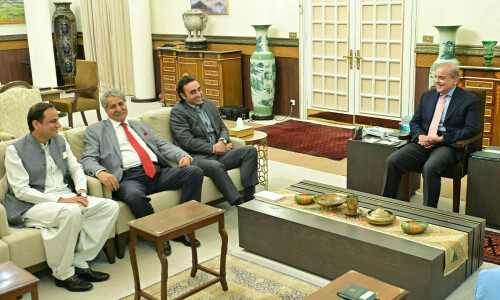
KARACHI: Renowned economist Dr Kaiser Bengali has said that he is not in favour of abolishment of 150,000 government jobs from BS-1 to 16 and privatisation of the Utility Stores Corporation, emphasising that the entire burden of “rightsizing” is being imposed on the lower income strata of society.
Speaking at a press conference to explain his reasons behind quitting the federal government’s High-Powered Committee for Rightsizing, he said he was extremely disappointed and saddened over the lack of the government’s commitment to reduce expenditures.
“I was immensely disappointed to see that of the 70 government organisations reviewed, the committee recommended privatising 17 commercial entities and retaining 52 government organisations, closing down only one,” he said while speaking at a media briefing at the Karachi Press Club.
Citing reasons behind his resignation, Dr Bengali said that the foremost priority of the government should be to stem the fiscal hemorrhage that threatens to be ‘fatal’ for the economy and the country. “Yet, the focus of the cCommittee has shifted to retaining almost all the government entities but making them more efficient,” he lamented.
Kaiser Bengali says he opposed axing of 150,000 jobs, privatisation of Utility Stores
Another reason behind his resignation, he said, was that he had challenged the committee’s recommendation to abolish 150,000 BPS 1 to 16 low-cost positions and privatise Utility Stores Corporation, saying that the entire burden of “rightsizing” was being imposed on the lower income strata of society and that there was no mention of any of the high-cost Secretary, Additional Secretary, Joint Secretary, director-general, etc. positions that would be eliminated.
He shared that in his detailed report to the committee, he had recommended abolishing 17 divisions and nearly 50 government organisations that would have reduced a substantial number of BPS 20 to 22 positions and affected annual savings of over Rs30 billion in ‘non-salary costs.’
Responding to questions, he said that initially two technical committees were formed, which were dissolved and later on the said high-powered body was formed.
He said there were three institutions in health department related to population control whose performance was poor but the government wanted to retain them. Similarly, there were two institutions in Industries Department pertaining to minerals. Though minerals were a provincial subject, the federal government wanted to retain the same.
He also shared that in the high-powered committee, two-three ministers and MNAs were included whose motives were other than controlling the expenditure, though the premier has shown his interest in reducing the expenditures.
About the stance of the federal government on his resignation, Dr Bengali said that it wanted to close one institution out of 53 and wondered what was the ‘misunderstanding’ about it.
He said the Small and Medium Enterprises Development Authority had done nothing as small industries were being closed mainly because of high electricity rates. He said ending of the PWD was a ‘unilateral’ decision of the prime minister.
Dr Bengali said that, come the last date of filing tax returns, he will submit his returns one day late in ‘protest against the government’s non-serious approach to arresting the fiscal profligacy eroding the economic base.’ He called upon all tax-paying companies and individuals to do the same.
He said he was saddened to see that the economy has collapsed and the country could not be run without loans that were being obtained for retiring debts mainly. But there was no realisation in Islamabad about such state of affairs, he added.
He said certain individuals were ‘resisting’ the ending of institutions/departments for their “vested interests.”
To a question about capacity payment to independent power producers, Dr Bengali said that this was a separate issue which was linked to the country’s ‘sovereign guarantees’ and he would not like to give a ‘casual statement’ about it.
Published in Dawn, September 3rd, 2024












































Dear visitor, the comments section is undergoing an overhaul and will return soon.